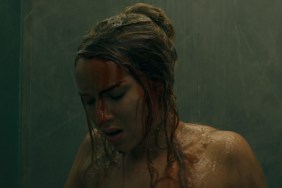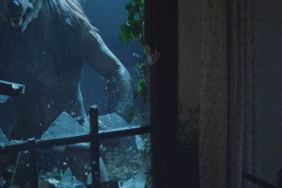
Following the decline of Hammer Horror in the 1970s, British horror was searching for an identity. Which is not to say it was dormant. Several homegrown horrors on the British Isle achieved cult success with films like Witchfinder General (1968), The Wicker Man (1973) and Hellraiser (1987). It wasnt until 2002 however, that the British film industry experienced a macabre re-birth with the double whammy of Danny Boyles 28 Days Later, which updated the zombie outbreak for a new millennium and Neil Marshalls Dog Soldiers, a bloody reimagining of the English Eerie.
Working as a film editor for several years, Marshall made an impact in the horror scene with his directorial debut, which details a squad of British soldiers dropped in Scottish Highlands for a military training exercise, only to be attacked by werewolves who have invaded the area. The film performed well in genre circles, creating a small but dedicated fan base that were primed for Marshalls follow-up, The Descent. Released in 2005, The Descent was a critical success which strong reviews from large and small publications resulting in an 85% Fresh rating on Rotten Tomatoes. Following six women as they descend into an uncharted cave in the Appalachian Mountains and discover they are not alone, the film is a powerful, gripping and visceral experience.
Acclaimed director Guillermo del Toro has referred to his films The Devils Backbone (2001) and Pans Labyrinth (2006) as siblings, with the former representing the brother and Pans Labyrinth the sister. Both films share themes but deal with them differently, creating different experiences which feel connected through an underlying principle or moral code. Marshalls Dog Soldiers and The Descent feel like grown up siblings. They dont share the wonderment of del Toros works, but rather embrace the hardened quality that comes with adulthood and trauma.
Dog Soldiers opens with two brutal prologues, one of a couple camping in the wooded locale of the film, only to meet a grisly demise (a scene that wouldnt be out of place in any slasher), and another scene establishing the protagonist and antagonist in an earlier military exercise. The main plot then gets swiftly underway. An army unit dropped off in the Highlands are up against a SAS unit in the wilderness nearby. Discovering that all but one of the SAS unit are dead, having suffered a brutal attack by werewolves, the army are also besieged with some members gravely injured. They are picked up by a young zoologist named Meghan who drives them to supposed safety in a small nearby cottage. From there the unit spends the film fighting off the werewolves as they draw closer.

The Descent also begins with a prologue, which casts a long shadow on the entire film. Sarah (Shauna MacDonald) suffers a tragic accident in which she loses her family. A year later, she and five friends go spelunking in what they learn is an uncharted system. After one of the cave passages collapses, they desperately search for a way out as they come into contact with monstrous creatures. Referred to as Crawlers, the things continually attack the group as dark secrets emerge.
Both films aim to subvert the gendered expectations of each group. In Dog Soldiers, the unit takes refuge in a small cottage, typically a place of domesticity and quiet, and repurpose it; the walls barely containing the bloodshed that occurs within. The Descent focuses on a group of women with a penchant for extreme sports, something not normally depicted in film. The films play off of our expectations by situating the main action in locations normally foreign to the kinds of characters. By doing so, the films create a rush which propels the plots forward into new and exciting territories.
One main facet of British horror films is the concept of the English eerie, the idea that the British Isles are haunted by their history, specifically the forgotten or destroyed histories that the larger world knows nothing of. Marshall utilizes this idea in both films (transporting it to America for the setting in The Descent), to reveal something hidden in plain view. The central question of Dog Soldiers quickly becomes who or what sent the werewolves and why were these units sent into the same area? In The Descent, the women venture into uncharted territories, revealing more about the characters than the landscape of the caves. Only when their backs are against the (literal) walls can these characters truly confront their personal as well as monstrous problems.

Marshall plays up these themes by removing the characters from the city and modern amenities, making their humanity and camaraderie all the more important and defining. If ghosts and monsters have been created to represent our subconscious fears and frustrations, then Marshall let them back into the fold to confront us once more in an age which moves us away from person-to-person interaction and closer to our screens. Here, Marshall gives his characters nothing to hide behind.
Marshall has since gone on to make Doomsday (2008) and Centurion (2010), both of which found less of a following than Dog Soldiers or The Descent. In recent years, the director has been focusing on television, with acclaimed stints on Game of Thrones and Constantine. His first films stand the test of time, having become contemporary benchmarks in the genre. Both challenge our expectations of horror and ourselves, creating bold new narratives that may appear simple, but remain unforgettable.
—
Alexandra West is a freelance horror journalist who lives, works, and survives in Toronto. Her work has appeared in the Toronto Star, Rue Morgue, Post City Magazine and Offscreen Film Journal. In December 2012, West co-founded the Faculty of Horror podcast with fellow writer Andrea Subissati, which explores the analytical side of horror films and the darkest recesses of academia.









